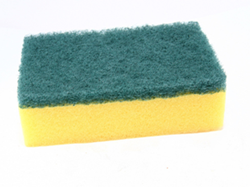 Kitchen sponges are notorious for trapping food particles which can lead to bacterial growth. This can lead to cross contamination and foodborne illness.
Kitchen sponges are notorious for trapping food particles which can lead to bacterial growth. This can lead to cross contamination and foodborne illness.
In a recent study, researchers evaluated polyurethane foam sponges and cellulous sponges and different treatments to help clean and sanitize them. The polyurethane foam sponges disinfected with chlorine reduced pathogenic E. coli up to almost 90%. Cellulose sponges reduced chlorine levels by 24% after 30 minutes of soaking. This reduces the effectiveness of disinfection. Total numbers of bacteria and E. coli were less in both antimicrobial polyurethane sponges and regular polyurethane sponges.
Bottom line, if using sponges, try polyurethane types, keep them disinfected, and replace them often.
Food Protection Trends, Vol 37, No. 3. p. 170-175